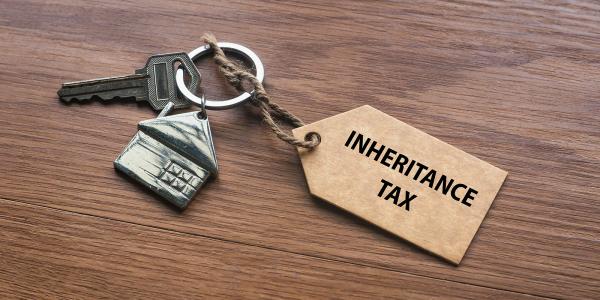Inheritance tax
Most estates in the UK are not liable to inheritance tax (IHT) because their value, including gifts made in the seven years prior to death, is less than the nil rate band. In addition, where assets pass to a surviving spouse or civil partner who is domiciled or deemed domiciled in the UK, there is generally no inheritance tax to pay. However, even if there is no IHT to pay, you may need to complete some IHT forms.

Content on this page:
The nil rate band
The nil rate band (NRB), also known as the inheritance tax (IHT) threshold, is the amount up to which an estate has no IHT to pay. Each person’s estate can benefit from the NRB. A ‘residence nil rate band’ may be available in addition to the NRB. Any unused NRB and residence nil rate band may be transferred to a surviving spouse or civil partner.
Each individual has their own NRB which is £325,000 for 2024/25. Any part of the estate up to the NRB threshold is chargeable to IHT at a rate of 0%. Any part of the estate that exceeds the NRB threshold is usually chargeable to IHT on death at 40%.
The NRB applies to the taxable, non-exempt estate passing on death together with any taxable gifts made within the seven years before death.
The residence nil rate band
The residence nil rate band (RNRB) is available where a death occurs on or after 6 April 2017. It is an additional nil rate amount available on top of the NRB where the deceased left a residence, or the sale proceeds of a residence, to his or her direct descendants. It is explained further on GOV.UK. The RNRB is reduced in the case of high value estates (gross value exceeding £2 million).
Please note that the RNRB can be complex to apply, especially, for example, where the deceased downsized their home prior to their death – for example, they sold a residence and bought a less valuable property or sold a residence and went into residential care. HMRC publish guidance explaining how the RNRB works in respect of people who have downsized.
We would, however, recommend that you take professional advice due to the complexity of this area.
Transferring the nil rate bands
Each individual has their own NRB and RNRB.
For married couples and members of a civil partnership, it is possible for any unused proportion of the NRB/RNRB of the first spouse or civil partner to be transferred to their survivor. This means that any part of the NRB and/or RNRB that is not used when the first spouse or civil partner dies can be transferred to the surviving spouse or civil partner for use on their later death.
Where HMRC accept a claim to transfer unused NRB and RNRB, the bands that are available when the surviving spouse or civil partner dies are increased by the proportion of the bands unused on the first death.
Note that the whole amount of the NRB and RNRB may be transferred to the surviving spouse or civil partner. This will be in cases where there was no taxable estate on first death – for example where the whole estate was left to a spouse and qualified for spousal exemption, see below. The NRB of the survivor will therefore be worth £650,000 and the potential RNRB will be £350,000 (2024/25 rates). This means it is sometimes possible for an estate of up to £1 million to be left IHT free, provided the specific RNRB conditions are met.
Gifts that are exempt from IHT
Some gifts are completely exempt from IHT whether you make them during your lifetime or on your death, and others are exempt only if you make them during your lifetime.
If any gift is exempt from IHT, it will not be included in the calculations when working out whether any IHT is due.
Although there may not be any IHT payable on lifetime gifts you make, the capital gains tax effect must be considered if you are disposing of chargeable capital assets – say, for example, you have a second home and decide to give it to your children.
Gifts exempt from IHT during lifetime and on death
Gifts to your spouse or civil partner
If you make a gift to your spouse or civil partner, during lifetime or on death, this is exempt from IHT, provided that they are UK-domiciled or deemed domiciled. There is more information on domicile in our page Residence and domicile and more detailed information in HMRC's Inheritance Tax Manual. If there are any doubts as to domicile status we strongly recommend taking professional advice.
If a spouse or civil partner is not UK-domiciled or deemed domiciled the limit for exempt gifts between spouses or civil partners is different. From 6 April 2013, value up to the limit of the prevailing nil rate band (currently £325,000) may be transferred to a non-domiciled spouse or civil partner. Any additional sum transferred is liable to IHT if the transfer is on death. Transfers to a non-domiciled spouse or civil partner during lifetime are potentially exempt transfers (PETs) – see below.
This exemption for gifts to spouses or civil partners does not cover gifts you make to your unmarried partner or a partner that you are not in a registered civil partnership with.
Gifts to charities
You can make IHT exempt gifts, during lifetime or on death, to most UK charities or to registered community amateur sports clubs. From April 2024 it is no longer possible to obtain relief for bequests to non-UK charities, so if you have a bequest in your will that would have previously qualified, you may wish to revisit your will.
Gifts to political parties
You can make an IHT-free gift to any UK political party as long as at the last general election it had either at least two MPs in the House of Commons, or one MP and received at least 150,000 votes.
Gifts exempt from IHT on death only
There are certain gifts that will be exempt on death only, so would only apply to assets passing on death (whether under a will or under the rules of intestacy). The exemptions apply in situations where certain members of the armed forces or emergency services are killed during active duty. You can read more about these exemptions on GOV.UK.
Lifetime gifts exempt from IHT
Broadly speaking, if you make any gifts in your lifetime and survive for seven years after making them, then their value will not be counted as part of your estate on death and will be exempt from IHT. These lifetime transfers to individuals are called potentially exempt transfers (PETs) and become totally exempt once the donor has survived for seven years from the date of the gift.
You must have given up all rights to the asset for it to fall within the PET rules. For example, if you give away your home and want it to be a PET, you cannot usually continue to live in it, unless you pay a full market rent. This is due to the rules related to ‘gifts with reservation of benefit’. You can read more about these rules on GOV.UK.
In addition, there are certain gifts you can make in your lifetime which are completely exempt from IHT, whether you survive seven years or not. You can read about these on GOV.UK.
If you make a gift which is a PET but do not survive seven years, this becomes a ‘failed PET’ and IHT might become payable.
IHT on lifetime gifts (failed PETs)
If you die within seven years of making a gift which is a PET, the gift may become chargeable to IHT. However, there will only be IHT to pay if the value of your taxable estate on death, together with the value of PETs made within the last seven years, exceeds the NRB at date of death. Note, the RNRB cannot be set against failed PETs – this is only available in respect of assets held at the date of death.
You do not need to notify HMRC about any PET when you make the gift during your lifetime and there will be no tax to pay at that time. However, you need to keep a record, in date order, of all the PETs that you make, until the seventh anniversary of each gift.
If you die within seven years of having made a gift, but your total gifts to date (within the seven-year period) are less than the NRB (£325,000 in 2024/25), there will be no IHT to pay on the gifts. However, the gifts use up some of the NRB that could have otherwise been set against the value of your estate on death, so the gifts could, overall, affect the amount of IHT paid on your estate.
If you die within seven years of making a gift, and your total gifts to date (within the seven-year period) are more than £325,000, the recipient of the gift might have some IHT to pay. They can, however, use any annual or other exemptions to reduce the value of the gifts that are included in the calculation, based on what you had available at the date of the original gift. This IHT payable would be in addition to any IHT payable by the personal representatives on the estate held at death.
You can see how this works on GOV.UK.
IHT on certain gifts to trust (chargeable lifetime transfers)
If you make a lifetime gift into some types of trust, the gift will be a chargeable lifetime transfer (CLT). You may have to pay IHT at the time of making the CLT, if its value is more than the IHT nil rate band (£325,000 in 2024/25).
You can read about the tax implications of making gifts into trust on our page Trusts and estates. There is also information on GOV.UK on CLTs generally and about gifts into trusts.
IHT reliefs
Some types of asset get special relief from IHT (in other words their value is reduced for IHT purposes, meaning that less IHT is due). These reliefs affect property relating to a trading business or agricultural property.
Further help and information
For basic information on IHT have a look at the section on GOV.UK.
More technical information can be found in HMRC’s Inheritance Tax Manual. In particular, their section on gifts with reservation can be found starting at page IHTM04071. Their guidance on exempt lifetime gifts starts on page IHTM14131.
For sources of advice, see our page Tax help on bereavement, trusts and estates.



